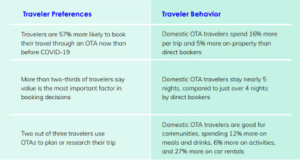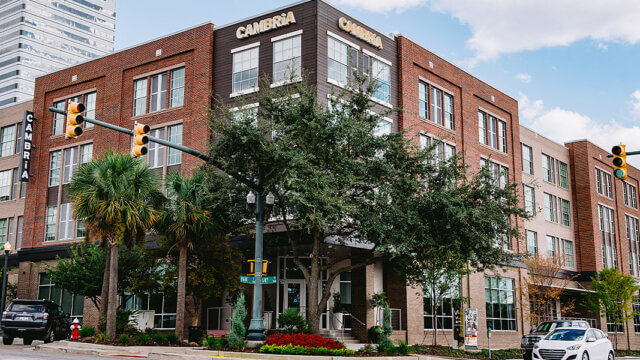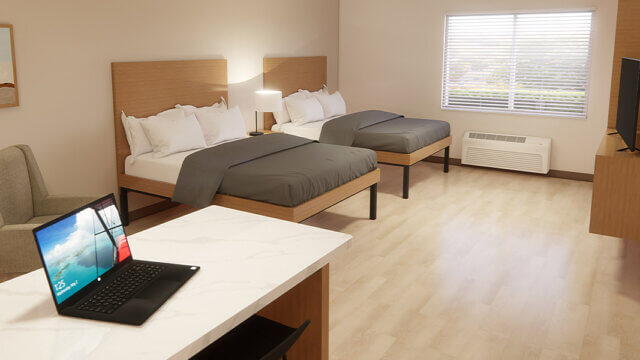SEATTLE—A new Expedia Group study, in partnership with research firm BVA BDRC, examines the contributions of online travel agencies (OTAs) to the US travel and tourism sector, the spending patterns of OTA travelers and the role of OTAs in the hotel booking journey. The research points to the increasing importance of OTA travelers to propel economic recovery for the U.S. travel industry.
Key findings

Preference for OTAs is on the rise
Based on the research, travelers are 57% more likely to book a hotel via an OTA than before the pandemic. Because OTAs attract more leisure travelers, they are well-positioned to capture the only segment currently traveling. However, other emerging traveler booking motivations contribute to a rise in preference for OTA, including:
- To get the best nightly rate (69%)
- To get the best room (40%)
- To compare properties in one location (35%)
- Other motivations include earning reward points (32%), one-stop shopping (28%) direct promotions (26%), and buying a bundled offer, such a flight and hotel, in one transaction (25%).
OTA travelers spend more, stay longer and support economic stimulus
The research reveals that prior to the pandemic, OTA travelers stayed more nights, spent more on-property, and generated more revenue for local communities compared to direct hotel bookers:
- OTA travelers stay more nights compared to direct hotel bookers. On average, domestic OTA travelers stay nearly five nights, while direct bookers stay just more than four nights. International OTA travelers stay nearly 7.5 nights, compared to seven nights for hotel bookers.
- Domestic OTA travelers spent 16% more per trip than direct bookers and, despite the perception that OTA travelers are searching for cheaper rates, they spend nearly the same amount as direct bookers on accommodations. Domestically, OTA travelers are more likely to book higher-end hotels, such as upper full service or luxury, than direct hotel bookers: 22% (OTA) vs 16% (hotel direct).
- Domestic OTA leisure travelers spend nearly 5% more on-property than hotel bookers, including amenities such as the hotel pool, hotel bar, gym, laundry services, restaurant, mini bar, and spa. International OTA business travelers spent 5% more on their total trip prior to the pandemic. All OTA business travelers, both international and domestic, spent 5% more on daily expenses.
- OTA travelers generate more economic stimulus for both destinations and the supporting communities, spending more on meals and drinks (+12%), activities (+6%), and car rentals (+27%). Domestic OTA travelers are active travelers, with shopping, visiting cultural attractions, and partaking in local cuisine topping the list of trip activities.
“The industry is showing early and promising signs of recovery, but the way people travel—and how they make decisions—has changed,” said Cyril Ranque, president, Traveler Partners Group at Expedia Group. “As part of our goal to be a trusted partner to our travel suppliers, we are dedicated to unearthing the insight that will help them reset their strategies and attract the travelers that matter most.”
The study also uncovered additional insights into emerging traveler behaviors driven by the pandemic.
Key takeaways include:
- When will they go? Optimism peaked in June and gradually moderated in July and August. In June, 23% of respondents expected to travel within 1-3 months, 28% said within six months, and 22% said six to 12 months. The remaining were unsure when they would travel; they just know they would like to at some point.
- How will they get there? Throughout the summer, more Americans traveled by car, up 20% in June 2020 compared to June 2019.
- Where will they stay? Mid-market and upscale hotels were down 13% and 30%, respectively. Budget and luxury remained the most sought-after hotel types, and alternative accommodations like vacation rentals saw a meaningful increase in preference. Two-thirds of travelers looking at alternative accommodations cited the lower risk of exposure to the virus in less-populated areas as a key selling point.
- Will they travel for work? Corporate travel is on an uneven recovery path, defined by phases as travel restrictions lift. According to global research from Egencia, Expedia Group’s corporate travel management company, nine in ten companies believe their workforce will return to some business travel by January 2021, as government restrictions lift and the risk to employees declines. An interesting trend to emerge from COVID-19 is the “flexcation,” an extended vacation that provides the benefit of a holiday and the practicality of a remote workspace. Four out of ten travelers surveyed for this report were likely to book this type of travel.




